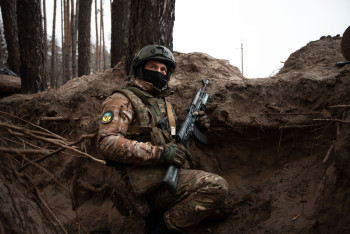Military: Importance of holding Bakhmut 'only increasing'

The importance of holding Bakhmut is "only increasing," Colonel General Oleksandr Syrskyi, commander of the Ground Forces of Ukraine, said on March 9.
According to Syrskyi, the main reasons behind this are that it allows Ukraine to prepare its reserves for future counteroffensives and exhausts the resources of the Russian army, namely the "most prepared and combat-capable" soldiers from the Wagner private military contractor group.
The battle for Bakhmut, a once prosperous industrial city in Donetsk Oblast, has been raging for the past seven months. The Russian military is attempting to increase its grip over the entirety of the oblast, around half of which it currently occupies.
Despite the heavy fighting, Ukraine has not withdrawn soldiers from the city.
On March 8, NATO Secretary General Jens Stoltenberg warned that Bakhmut could fall "in the coming days," but that the loss of the city would not represent a turning point in the war.
On March 6, U.S. Defense Secretary Lloyd Austin also remarked that the fall of Bakhmut would not be a significant setback for the Ukrainian military, adding that the city was more of a "symbolic" than "strategic" value.
Eastern Operational Command spokesman Serhiy Cherevaty responded to these comments on national television on March 9, saying that he appreciated their insight, but that NATO did not fully understand the situation on the ground in Bakhmut.
"The most recent conflict that NATO had somewhat tangential involvement in was the wars in the former Yugoslavia. These conflicts were relatively smaller in scale and required less deployment of troops. NATO is more accustomed to carrying out stabilization, training, and peacekeeping missions," Cherevaty said.
Cherevaty also recalled that some Western allies had predicted Kyiv would fall at the start of the full-scale invasion in February 2022 to further his point.
"They approach this purely pragmatically with dry calculations, sometimes not understanding that Ukrainians have developed much greater stability, non-standard actions, and the power of tactical decisions during the past year of war," Cherevaty added.
"I think others need to study this. They are already studying it."










